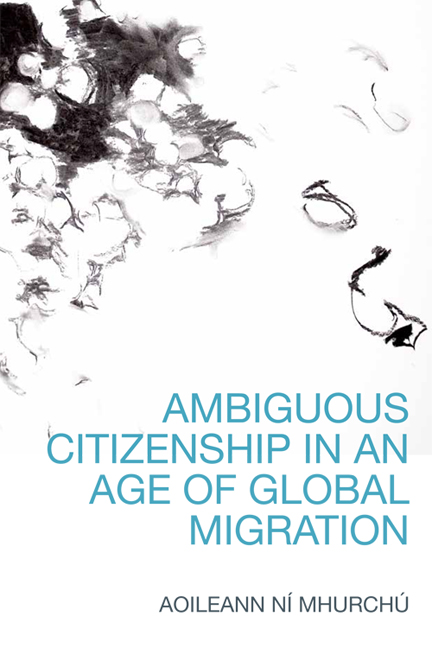Book contents
- Frontmatter
- Contents
- Acknowledgements
- Abbreviations
- Translations
- Introduction
- 1 Exploring the Citizenship Debate: The Sovereign Citizen-Subject
- 2 A Lens: The 2004 Irish Citizenship Referendum
- 3 Trapped in the Citizenship Debate: Sovereign Time and Space
- 4 Interrogating Sovereign Politics: An Alternative Citizen-Subject
- 5 Challenging the Citizenship Debate: Beyond State Sovereign Time and Space
- 6 Traces Rather than Spaces of Citizenship: Retheorising the Politics of Citizenship
- Conclusion
- Bibliography
- Index
Conclusion
- Frontmatter
- Contents
- Acknowledgements
- Abbreviations
- Translations
- Introduction
- 1 Exploring the Citizenship Debate: The Sovereign Citizen-Subject
- 2 A Lens: The 2004 Irish Citizenship Referendum
- 3 Trapped in the Citizenship Debate: Sovereign Time and Space
- 4 Interrogating Sovereign Politics: An Alternative Citizen-Subject
- 5 Challenging the Citizenship Debate: Beyond State Sovereign Time and Space
- 6 Traces Rather than Spaces of Citizenship: Retheorising the Politics of Citizenship
- Conclusion
- Bibliography
- Index
Summary
So many stories to tell … such an excess of intertwined lives events miracles places rumours, so dense a commingling of the improbable and the mundane … I have been a swallower of lives; and to know me, just the one of me, you'll have to swallow the lot as well.
Saleem SinaiThe above observation is made by the protagonist of Salman Rushdie's Midnight's Children, who describes himself as mysteriously yet irrevocably ‘handcuffed to history’. Born at the dawn of Indian independence (exactly on the stroke of midnight), Saleem Sinai tells the story of how he came to represent the entirety of India and all its religious and national diversity within and across (as opposed to in terms of) his unitary self. In order to explore the diversity of his Being (‘all kinds of everywhichthing … jumbled up inside’), Saleem is forced to resist the idea of wholeness associated with ‘the body … homogeneous as anything. Indivisible, a one-piece suit, a sacred temple if you will.’ He is forced to resist attempts by others ‘to bully [him] back into the world of linear narrative, the universe of what-happened-next’ Ultimately, it is only by hovering ‘at the apex, above past and present’ in a body born with ‘two heads but you will see only one’ that he manages to tell the story of the lives of 600 million people bound up inside in one single self.
This book has explored another way in which people are handcuffed to history: as children born to migrant parents. It has explored how their subjectivity is inextricable from, as opposed to merely linked to, the diversity of the symbolic order. It has emphasised how these children similarly need to be understood as a dis jointed rather than coherent presence; as selves which contain a huge diversity within and across the notion of a coherent ‘I’. They are people whose citizen-subjectivity cannot therefore be understood merely in terms of the physical and imaginative space of the political subject as individual (the one) and/or groups of individuals (the many-as-one).
- Type
- Chapter
- Information
- Ambiguous Citizenship in an Age of Global Migration , pp. 220 - 234Publisher: Edinburgh University PressPrint publication year: 2014



